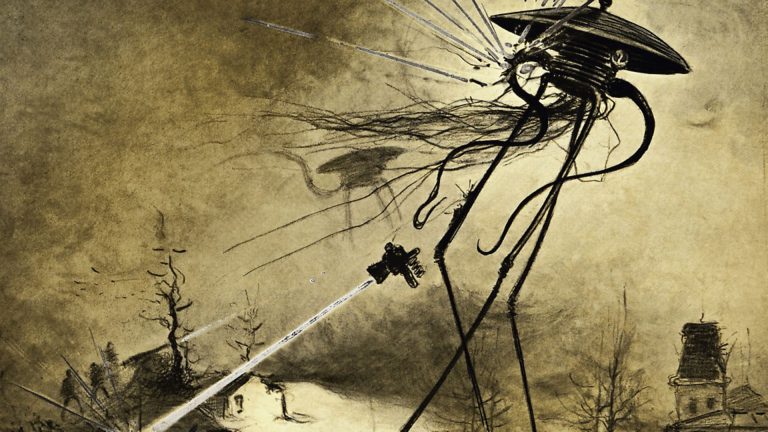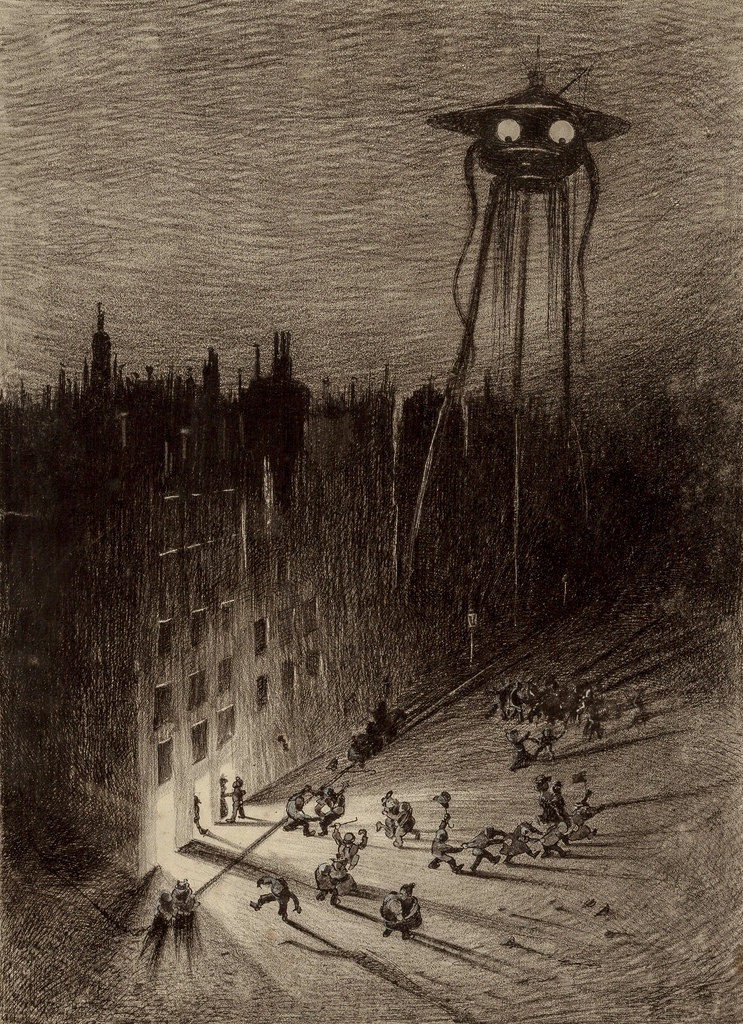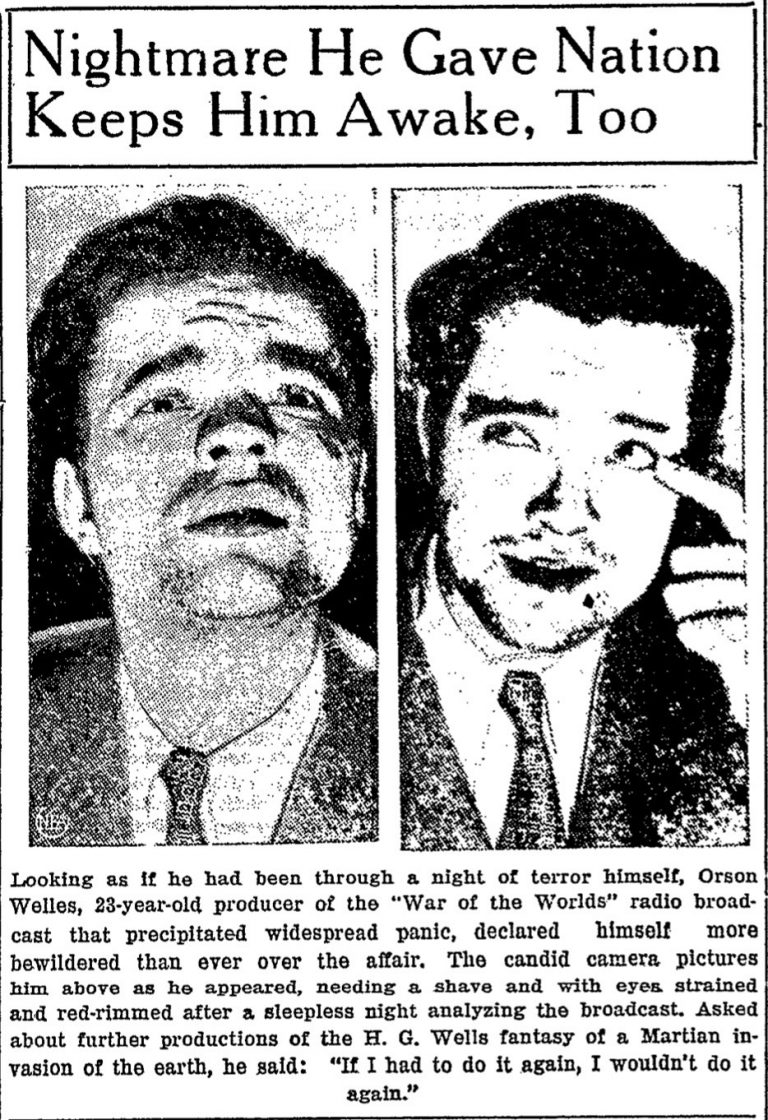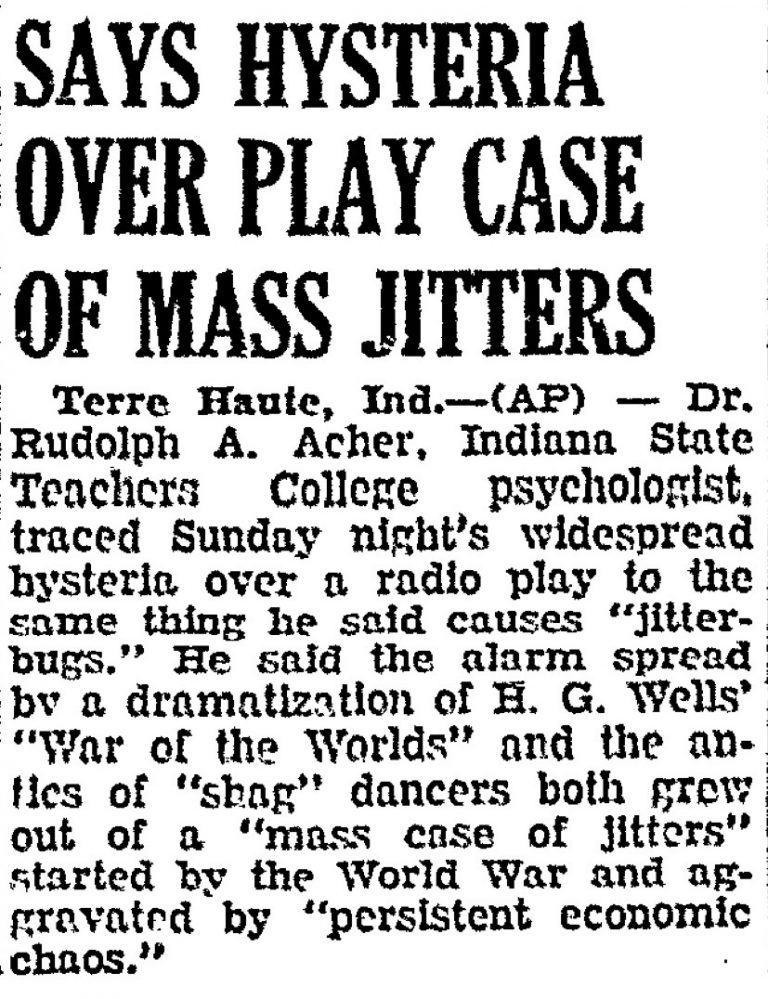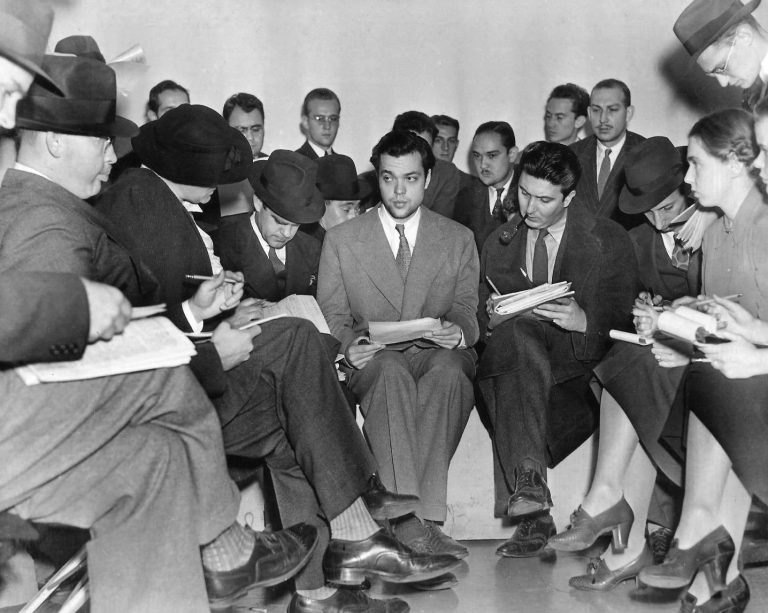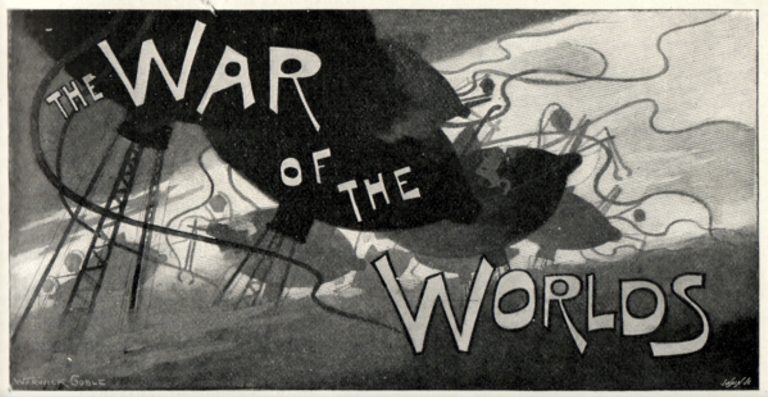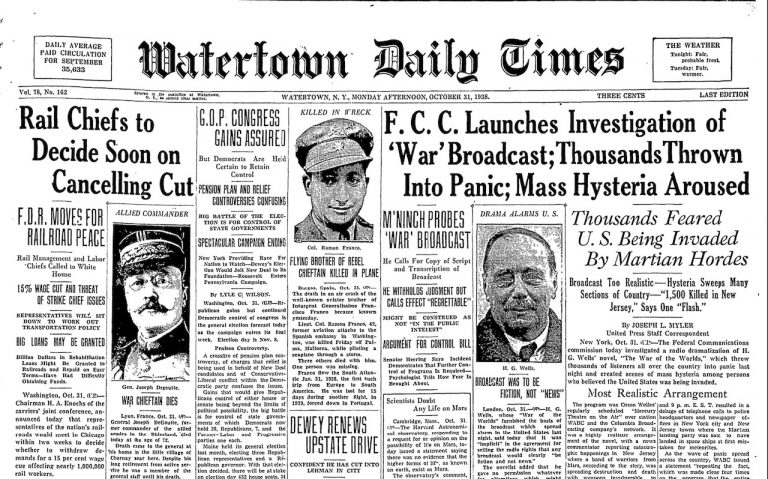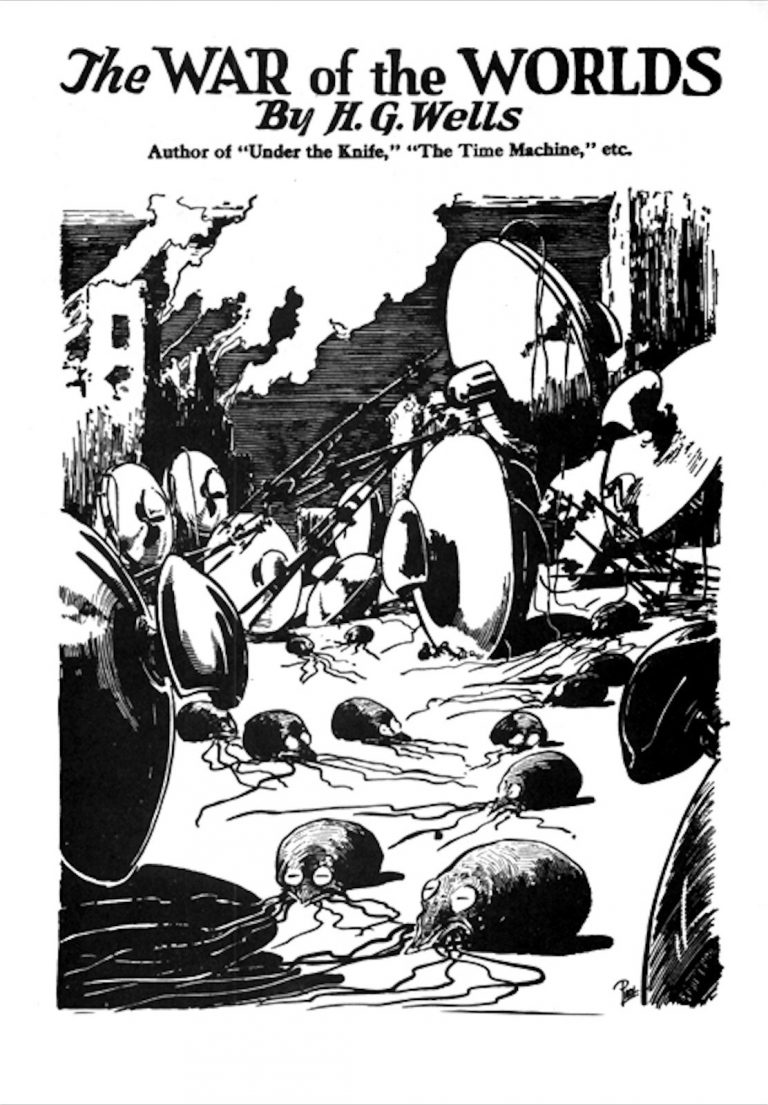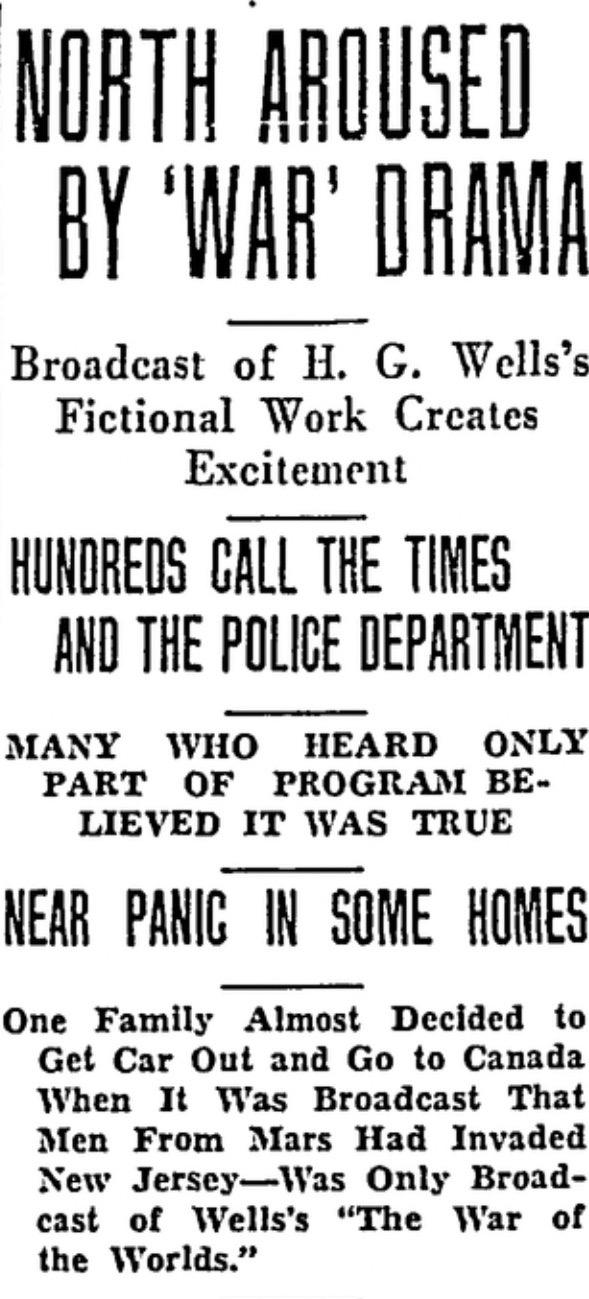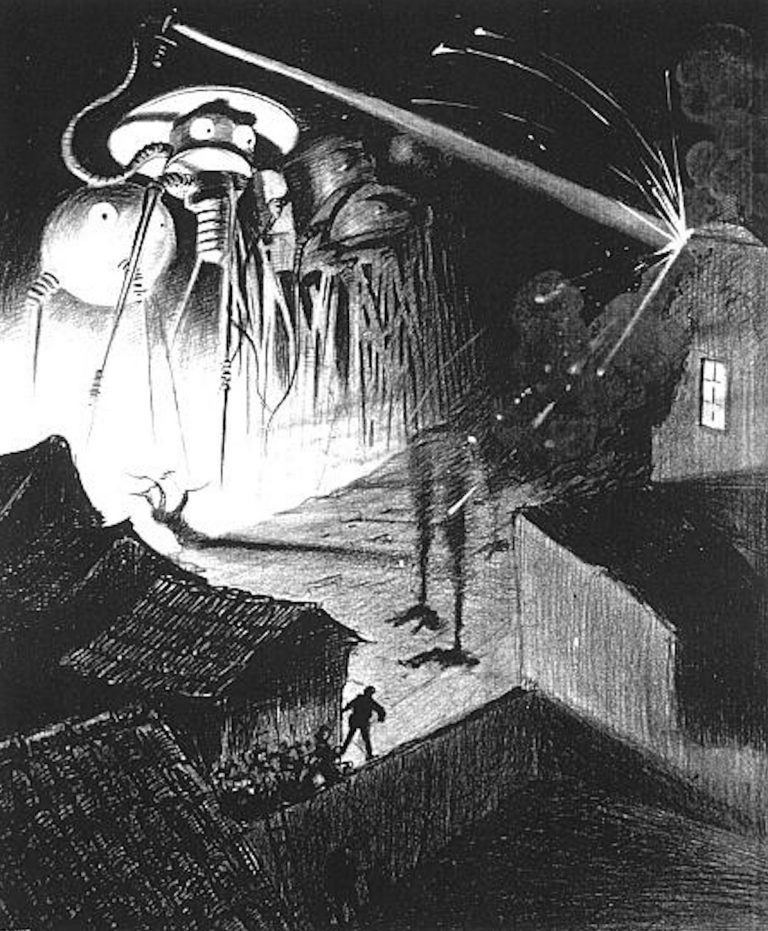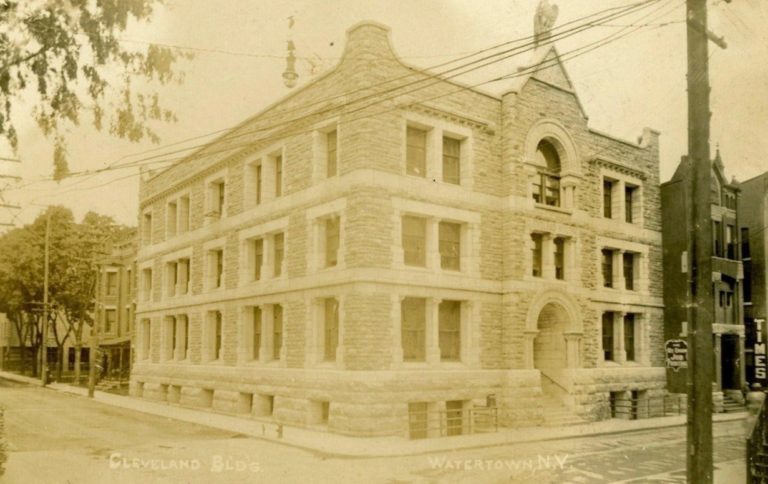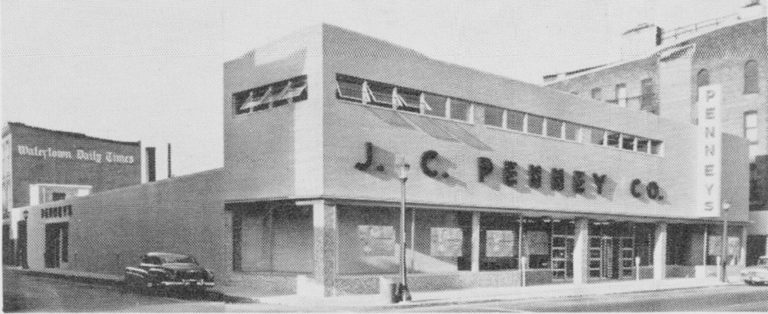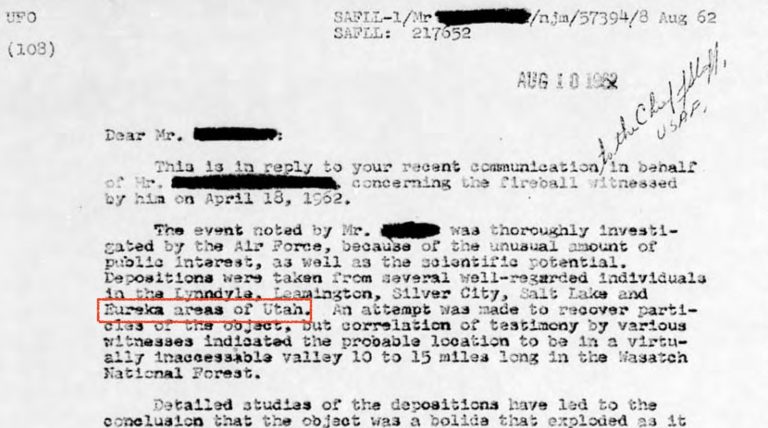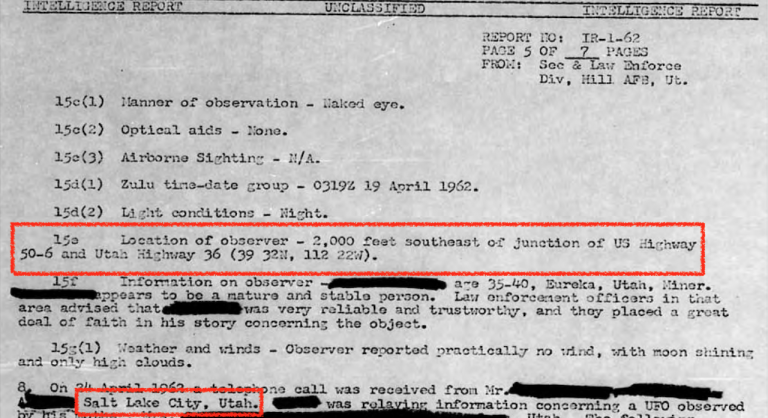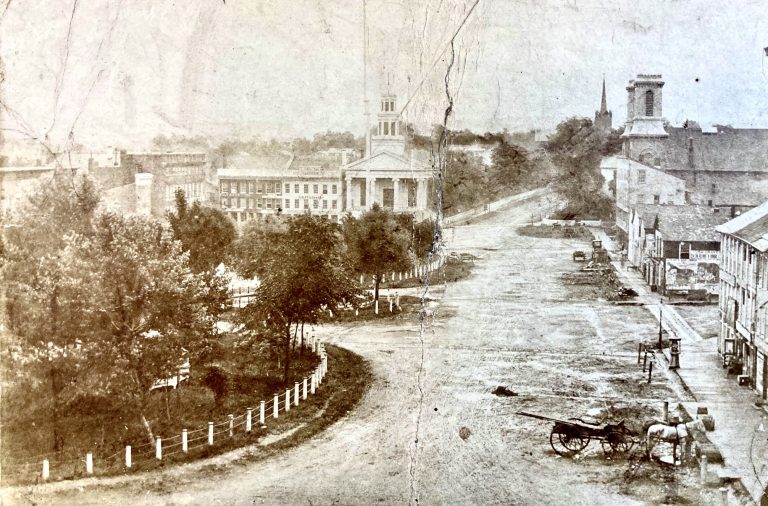October 30, 1938 War of the Worlds Old Time Radio Broadcast Causes Mass Hysteria
Before the golden age of television became the popular mode of home entertainment, H. G. Wells’s 1897 War of the Worlds serial in Pearson’s Magazine would make its dramatic debut on October 30, 1938, on the era’s more popular medium, the theater of the mind and Old Time Radio broadcasts. In the 1930s, radio was still a relatively trusted source of news and communication, with the likes of President Franklin D. Roosevelt holding “fireside chats” to comfort and keep people informed of the economy and war efforts abroad.
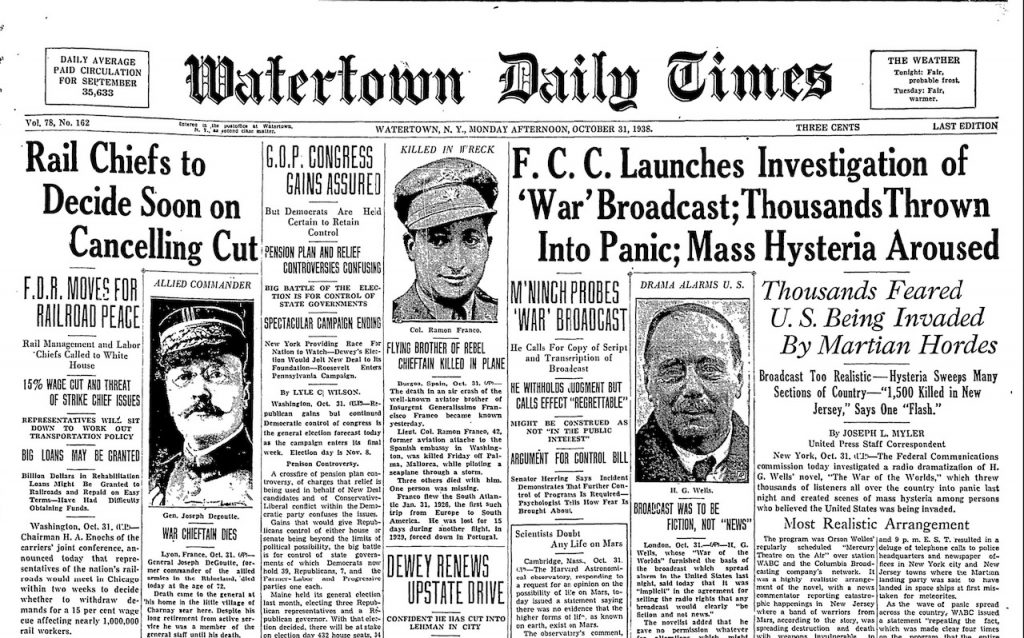
Then there was Orson Welles, of no relation to H. G. Wells, who would use the medium in a cleverly manipulative way to expose how fragile the human psyche can be during times of great societal stress and uncertainty. The broadcast of War of the Worlds, stated from the outset as a fictional play, would unnerve audiences who either missed the opening prologue or weren’t paying attention. The result would be mass hysteria and, subsequently, the realization that perhaps radio could not be trusted.
In Northern New York, the Watertown Daily Times and local police would be flooded with phone calls. The Times would expend an extraordinary amount of coverage in its Monday afternoon, October 31st edition with headlines such as “North Aroused By ‘War” Drama.
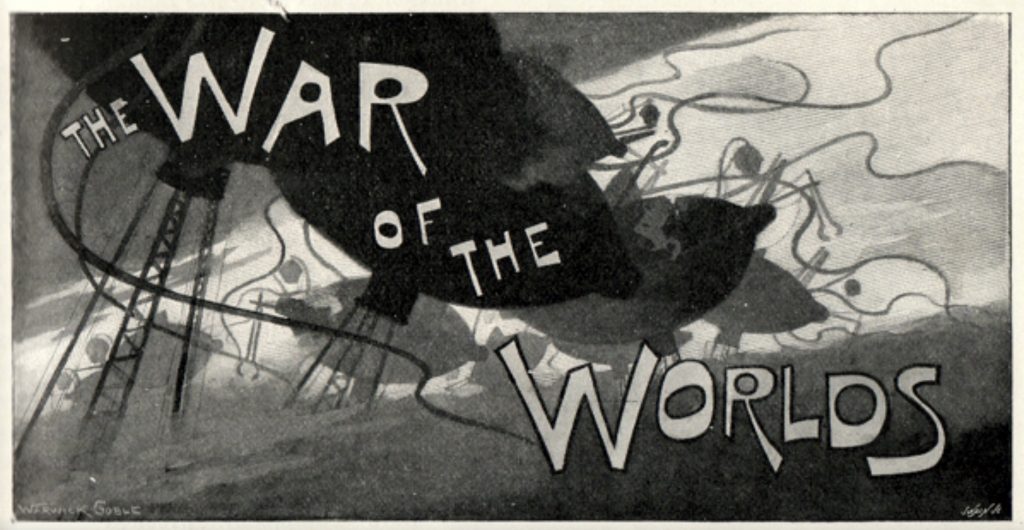
HUNDREDS CALL THE TIMES AND THE POLICE DEPARTMENT
Many Who Heard Only Part Of Program Believed It Was True
NEAR PANIC IN SOME HOMES
Hundreds of persons throughout the city and northern New York were suddenly aroused from a quiet Sunday evening last night when excited voices poured throughout radios proclaiming that strange men from Mars had landed in New Jersey in meteor-like airplanes and were killing and plundering in a manner never before seen on the earth. It was not until after hundreds of phone calls swamped the Times offices and the police station that it was generally learned the broadcast was merely a fictional play, “The War of the Worlds,” by H. G. Wells.
The broadcast originated in radio station WABC between 8 and 9 p.m. and was sent out over the country by the Columbia Broadcasting system. The program was the Mercury Theatre of the Air and the play was made realistic by the dramatization by Orson Welles.
Those persons who had not heard the beginning of the program but turned in after it started declared today that the broadcast of the “tragic affair” was so realistic that they believed it was an actual fact that Martians had suddenly swept down from Mars to invade earth. The announcers, speaking in present tense, said the Mars fighters were invincible and that thousands were dead and buildings were destroyed.
At The Times office between 8:30 and 9 more than 50 calls were received from persons in the city seeking to learn if the “disaster in New Jersey” was true. The voices were excited and some had reached an almost hysterical pitch.
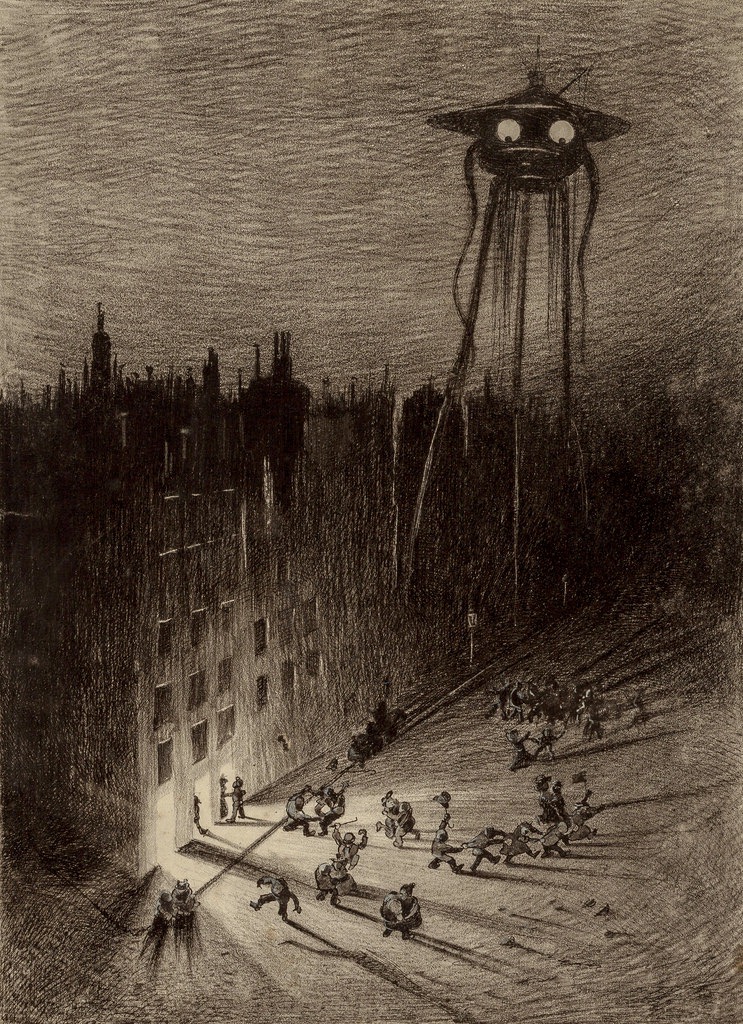
A telephone operator in Evans Mills would call The Times office where only one person was working. She requested any news or information on “The New Jersey” tragedy, stating she was swamped with telephone calls. The local police in Watertown faired no better. Sergeant John L. Couchette reported answering dozens of calls asking the same question. There were about 300 more calls than usual on Sunday evening per the New York Telephone company the following day.
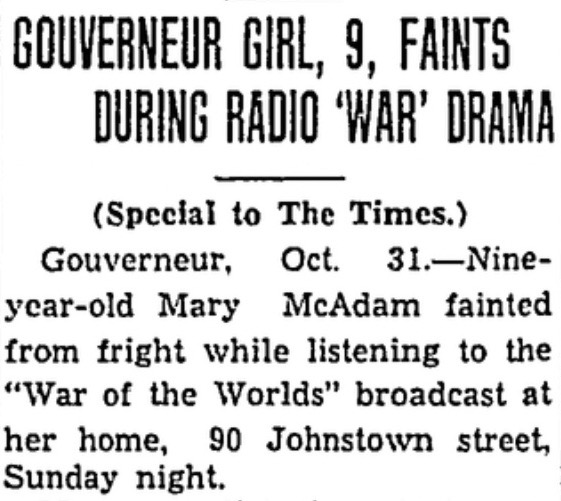
The Times article would continue–
Near panic swept over some families in this city, as it did throughout other sections of the nation. In one home here it was almost decided to get out the family car and head north for Canada. Others declared they were ready to flee the city. At one theatre here calls were received asking that certain persons be paged and told to come home at once.
After so much excitement and confusion had occurred throughout the state and nation, the New York City police department sent out a teletype message which was received by local police headquarters. It read:
“WABC informs us that the broadcast just completed over their station was only a dramatization of a play. No cause for alarm.”
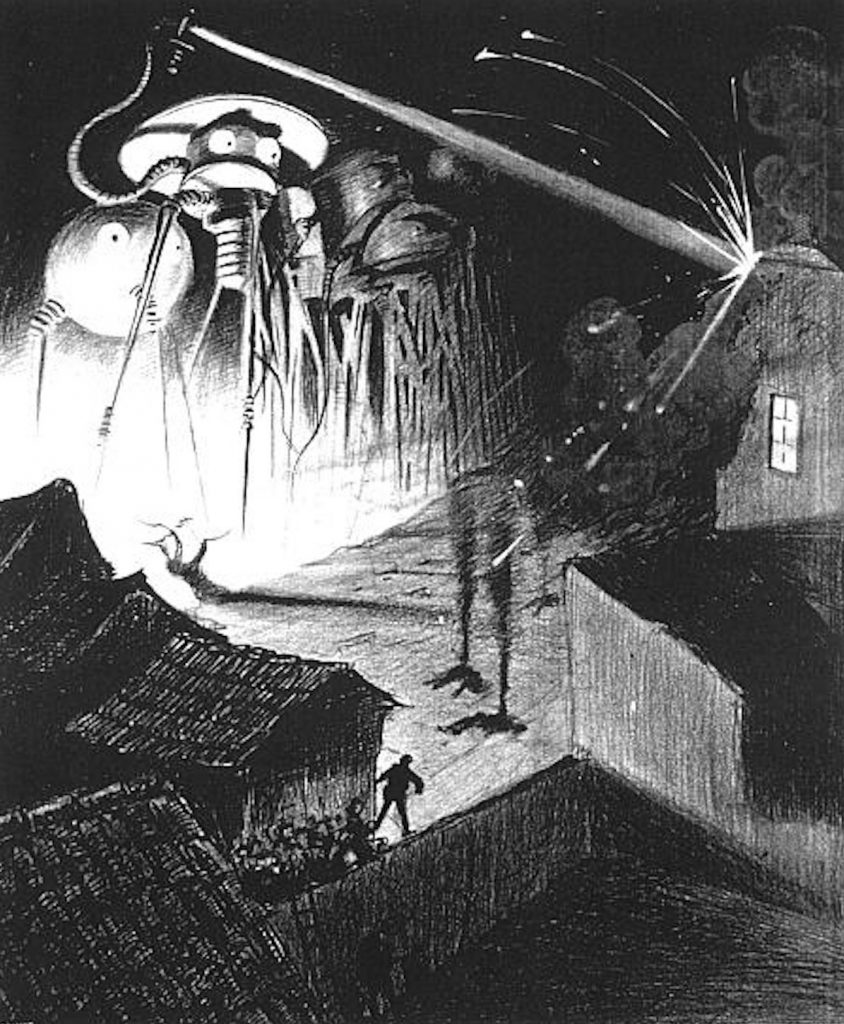
In Gouverneur, 9-year-old Mary McAdam fainted from fright while listening to the War of the Worlds broadcast. According to The Times–
Mary was listening at the radio with her mother, Mrs. Charles McAdam, and other members of the family. When an announcer said that the militia had taken over the networks, Mrs. McAdam and the children were alarmed. As the realistic reports of attacks by Martians in New Jersey and other sections proceeded, Mrs. McAdam and the children became really frightened.
Suddenly, Mary said, “Mother, I feel—” and then toppled over on the floor in a faint before she could complete the sentence. Her mother revived her with aromatic spirits of Ammonia.
The family had missed the opening, but it was noted that the announcement of it being a work of fiction was made four times throughout its hourlong broadcast.
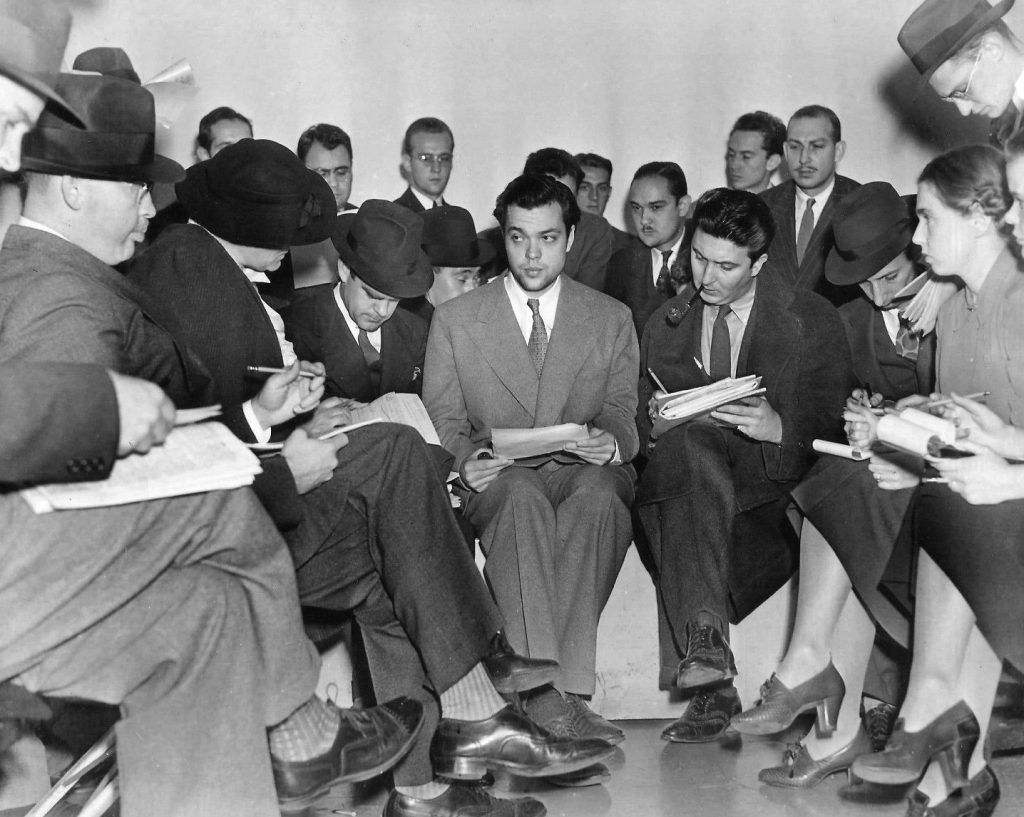
Elsewhere, in Concrete, Washington, the coincidental timing of a power failure that turned off the street lights added to the surrealistic events unfolding on the radio and provided further proof, at least to the mind’s untethered fears, that the end was near–
Just as an announcer was “choked off” by “poisonous gas” in what he had just said might be “the last broadcast ever made” the lights in Concrete failed.
They called friends on the telephone until all lines were clogged. They shouted from house to house. The more they talked the more excited they became. Others who had not listened to the program became alarmed. Hysteria swept over the more excitable of the thousand or more residents.
One man bolted from his home, grabbed a small child by the arm and headed into the adjacent pine forests. Others prepared hastily to “flee to the hills” in the belief the invasion already had reached across the continent from New York.
It was only when the news of the events being a dramatic play was making its rounds that the problem at a nearby power substation got resolved.
In Salt Lake City, Radio Station KSL said many persons reported packing their belongings to evacuate their homes, “children became hysterical, and grownups fainted at the ‘War of the Worlds’ program”
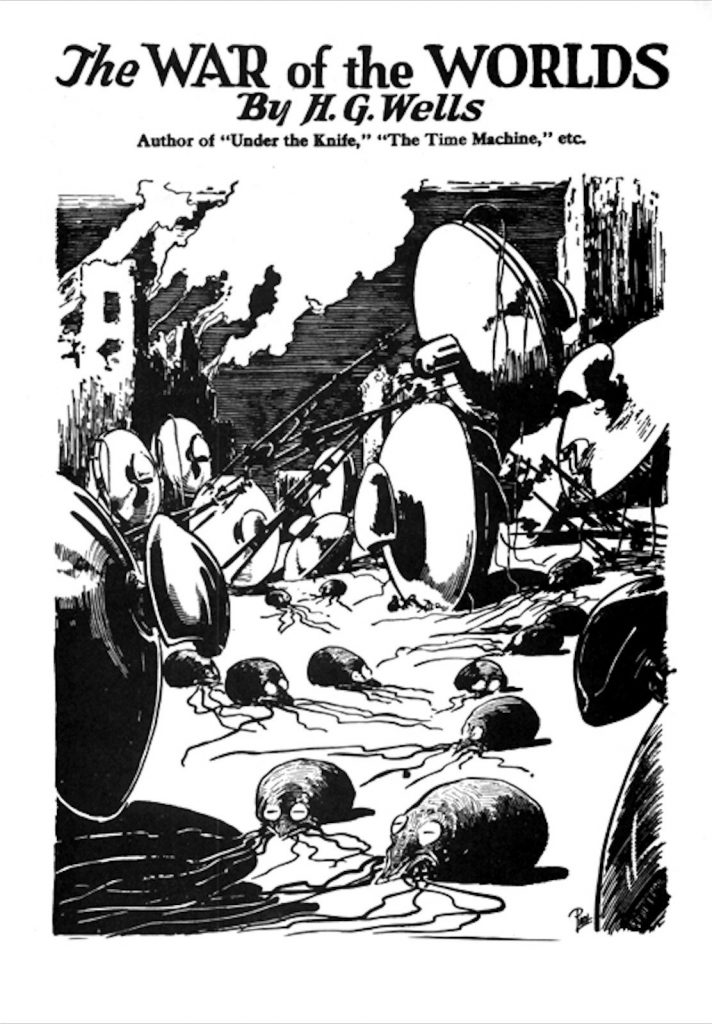
In San Francisco, telephone operators reported they were virtually swamped with requests for cross-continent telephone connections with New York and New Jersey. One puzzled elderly lady was informed that the report was only a drama and cheerfully remarked, “Well, if it doesn’t do anything else, it made a lot of people pray tonight.”
The Watertown Daily Times would also publish an article in the editorial section the following day pointing out the responsibilities of media—
The Federal Communications Commission proposes to make a sweeping investigation. That is right and proper but probably the investigation will disclose nothing but what is already known. The radio company intended it to be simply a realistic dramatization of a well known book. Announcement was made to that effect four times during the program.
It was all a little too real, however. A program of music was interrupted for what seemed to be a news report for what seemed to be a news report of a tremendous gas explosion in New Jersey. From then on these “news reports” came think and fast. The little men from Mars were swarming all over New Jersey. The United States was actually being invaded by a host from another planet.
If the radio people intended to make the broadcast realistic they certainly succeeded, even the announcement which seemed to come from the secretary of the interior that a state of war existed.
The broadcasting companies must learn what the newspapers learned long ago. A hoax cannot be perpetuated in the guise of news without serious consequences. The radio people have a grave responsibility in this matter.
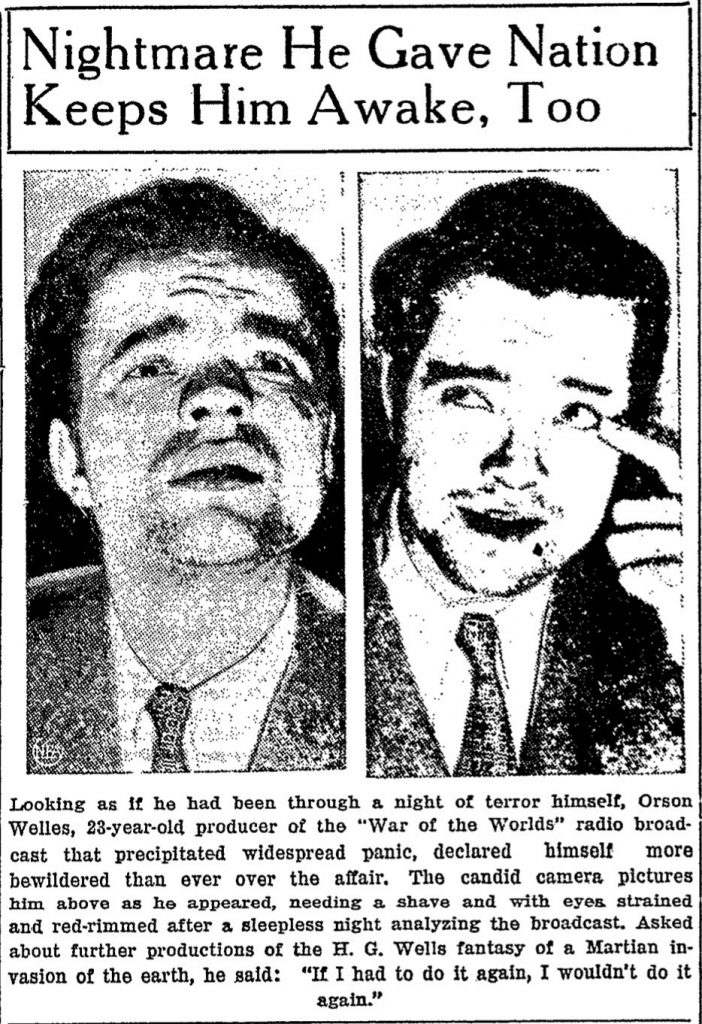
One looking back upon these events 85 years ago may scoff at how gullible people seemed, yet, at the same time, modern audiences themselves have been besieged by much more forms of complex media delivered with more immediacy in an era of “fake news,” manipulation and propaganda. It’s almost as if somewhere between then and now, somebody took the warning along with the social implications and saw not the fear of the lack of integrity but the basis for an opportunity.
The short analysis by a psychologist of the event back in 1938 blaming the hysteria on “Mass Jitters” —
Terre Haute, Ind. (AP) — Dr. Rudolph A. Archer, Indiana State Teachers College psychologist, traced Sunday night’s widespread hysteria over a radio play to the same thing he says causes “jitter-bugs.” He said the alarm spread by a dramatization of H. G. Wells’s “War of the Worlds” and the antics of “shag” dancers both grew out of a “mass case of jitters” started by the World War and aggravated by “persistent economic chaos.”
With all that being said, there are theories out there that the “panic” was created by the newspapers, which saw the medium of radio as a potential threat and thereby perpetuated the myth of panic as a means to censor the burgeoning medium. The problem with this is it would be one heck of a coordinated effort on behalf of the press across the country to get articles written for publication the very next morning. It should be noted the names in the Times articles were indeed real people in their noted locations and descriptions.
Then, other theories are explored in depth that postulate the War of the Worlds radio broadcast was a psychological experiment to study public reaction (and the potential for psychological manipulation and social engineering) to the output of the mainstream media financed by the Rockefeller Foundation. The theory traces Orson Welles’ connection to having cart blanche while making Citizen Kane for RKO Pictures, where Nelson Rockefeller sat on the board of directors.
And now, straight from the theater of the mind and Old Time Radio is Orson Welles’ 1938 presentation of H. G. Welles’ “War of the Worlds,” remastered and posted on YouTube.
